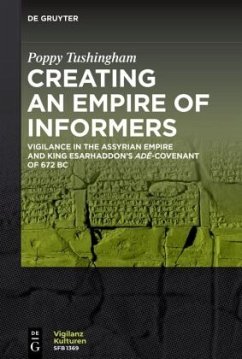Throughout history, many states have attempted to harness the attention of their populations for their own ends. This study argues that the Assyrian Empire in the year 672 BC is such a case.
In 672 BC, Esarhaddon, King of Assyria, imposed a succession covenant (adê) on his subjects, the inhabitants of the Assyrian Empire. This covenant required the empire's population to monitor one another, and themselves, for signs of disloyalty to the monarch and his chosen successor, Ashurbanipal. This study examines the aims and outcomes, desired and undesired, of imposing this duty of vigilance across the Assyrian Empire.
To consider the presentation and implementation of this duty of vigilance, the study draws largely on evidence supplied by the covenant and other royally-commissioned texts. To examine the outcomes of the covenant's enactment, meanwhile, it explores cuneiform sources, such as letters to the crown, private legal documents, and literary compositions,as well as the Aramaic Story of Ahiqar and the biblical Book of Deuteronomy.
By providing a sustained analysis of the real-world implications and outcomes of the covenant, this book sheds new light on a text that fundamentally altered the political makeup of the Assyrian Empire.
Hinweis: Dieser Artikel kann nur an eine deutsche Lieferadresse ausgeliefert werden.
In 672 BC, Esarhaddon, King of Assyria, imposed a succession covenant (adê) on his subjects, the inhabitants of the Assyrian Empire. This covenant required the empire's population to monitor one another, and themselves, for signs of disloyalty to the monarch and his chosen successor, Ashurbanipal. This study examines the aims and outcomes, desired and undesired, of imposing this duty of vigilance across the Assyrian Empire.
To consider the presentation and implementation of this duty of vigilance, the study draws largely on evidence supplied by the covenant and other royally-commissioned texts. To examine the outcomes of the covenant's enactment, meanwhile, it explores cuneiform sources, such as letters to the crown, private legal documents, and literary compositions,as well as the Aramaic Story of Ahiqar and the biblical Book of Deuteronomy.
By providing a sustained analysis of the real-world implications and outcomes of the covenant, this book sheds new light on a text that fundamentally altered the political makeup of the Assyrian Empire.
Hinweis: Dieser Artikel kann nur an eine deutsche Lieferadresse ausgeliefert werden.








